‘To help this world to be more peaceful’
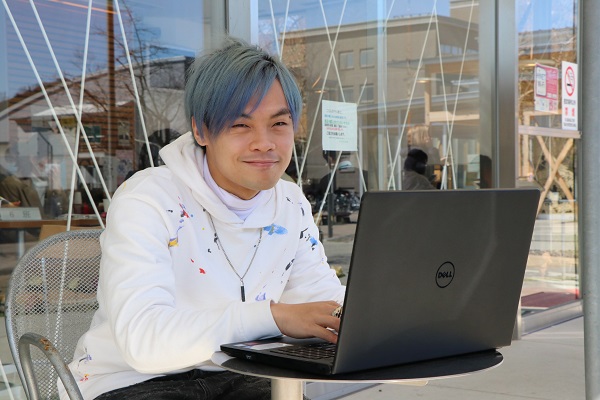
Name: Parkpoom Kuanvinit
Home Country/Region: Thailand
Affiliation: Graduate School for International Development and Cooperation (IDEC)
Hobbies: Individual sports like running, Thai boxing, and weight lifting. Also loves playing guitar and reading.
(Date of Interview: February 20, 2020)
Thank you for joining us today. I heard that you were recently awarded the 2019 Excellent Student Scholarship (*). What are your thoughts on getting this award?
I don’t know how they select the students, but I think the most evident results were from my grades, because I received “S” for almost every subject. Apart from that, I tried to participate in as many university events as possible, like seminars or poster sessions, and presented my effort to study. So, I think they saw my dedication to study and my true interest in acquiring the knowledge from every class I attended.
(*) A unique scholarship program of Hiroshima University to recognize outstanding graduate students in academic activities and to give them financial support for their study.
Where did you come from?
I’m from Bangkok, the capital city of Thailand, where there are lots of buildings and less trees and nature. If asked about the attractions, I think most people go there to visit the Emerald Buddha. It’s a big statue of the Buddha, located in a temple called ‘Wat Phra Kaew’ in the heart of the city, which is very beautiful. And it also reflects how Buddhism is important to Thai people as a national religion. Also, there is a place called “Khaosan Road” where there are so many night clubs, restaurants, coffee shops that open from evening until dawn of the next day.
What brought you here to study in Japan, at HU?
It’s actually related to my work background. Before I came here, I worked for the International Organization for Migration (IOM), which is the leading international organization in the field of migration under the United Nations. While working there, I had the chance to help migrants and refugees, so I realized problems about the movement of people, migrants, and refugees around the world. That was also when I started to be interested in studying international relations at the graduate level, in overseas country, especially in the perspective of migration. Because in future I want to work in the UN-related organizations again, but in the countries where the people are more suffering, such as those in the middle east or in Africa where people are affected by violence or wars. I would like to contribute to better lives of these groups of people. So I decided to study abroad to acquire more knowledge in the graduate level.
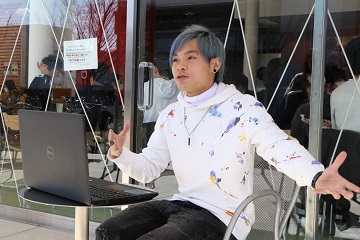
First, I chose the country. As a kid, I loved the Japanese cultures like manga, anime, music, and other entertainments. I grew up with these, and I always dreamt to be here not as a short-term tourist, but a long-term resident. That’s why I chose Japan to fulfill both my childhood and future dreams. I found the Peace and Coexistence Course in IDEC at HU, which is perfectly suited to my interest. Then I contacted (Prof.) Katayanagi sensei from the list of professors on the website.
As I read her background, I learned that she had work experience in the U.N. too. So I emailed, set up a skype meeting and had a conversation with her, and I felt like we had some sort of ‘good chemistry’. And our research interests matched. Luckily, she accepted me after the conversation ended. Everything went perfectly well. It was like a destiny.
Destiny, it brought you where you are now, right? By the way, how do you communicate with friends on campus?
I want to improve my Japanese skills, so I try to make friends with Japanese people. But the problem is, these Japanese people want to improve their English. (laughter) So even though I speak to them in Japanese, they reply in English. I think Japanese people have very good English skills and they feel comfortable communicating in English. And they are very helpful. When I ask for help, no matter what they are doing, they never tell me to wait. They will abruptly stop what they are doing no matter how busy they are, and help me first. It happens to me every time with everyone that I call for help.
Speaking of making friends, what do you think of social media? It’s now deeply embedded in our society.
I think this thing involves with our everyday life. Anybody can post anything at any time, and we can receive any information from everywhere at any time, too. So it’s very convenient, but at the same time, the users need to be very careful. When I say the ‘users’, I am not referring to only the people who post, but all of us who have these SNS accounts and can receive the information. It’s important not to post things that are inappropriate, but we cannot stop that. So as the receivers, I think all users need to be aware of the unreliability of these contents. There are false news, scandals, and many negative things all the time. So, we need to screen and consider every information very carefully.
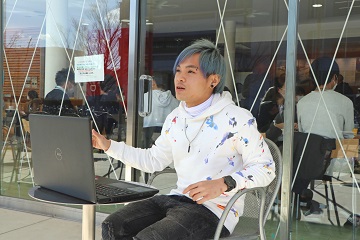
Are we able to build real relationships by SNS?
In terms of the true, sincere, and concrete relationships, I still believe in the face-to-face or physical interaction more. But I believe that we can develop ‘the start of the relationship’ by SNS. For example, I see the photo of someone on the ‘People you may know’ list, and then, I see them at the Mermaid Café on campus one day, I can go to them and say ‘Oh you are on my SNS list’, and we start the conversation and become friends.
Thank you for your opinion. Next, could you tell us about your major?
I am in IDEC, and my department is Peace and Coexistence where we study about the international relations, especially on how we can resolve conflicts at the intrapersonal, interpersonal, to the international levels.
What exactly does ‘conflict resolution’ means?
First, in my opinion, we need to admit that conflicts always happen and we cannot avoid them. But conflict is not always a bad thing. Because of conflict, we know that one party has a different opinion with the other party. And because of this difference, we can create ‘something new’, something that makes both parties happy. So for me, ‘conflict resolution’ is understanding and fulfilling the mutual needs between both parties to let them coexist peacefully.
I see. Your explanation reminded me of school bullies. Some students become very mean to others just because they are ‘different’.
I think education is very important to solve this problem. ‘Education’ here is not only the curriculum, but education on ‘how to live with other people’. The Sustainable Development Goals of the U.N.(SDGs) mentions about the importance of quality education, too. Basically, I think we should educate people how to ignore the difference.
‘Ignore’ the difference?
Yes. Regardless of their gender, appearance, religion, or anything, we are all people. And no one should be left behind. I think it is important to develop this norm and educate all the children when they are very young.
And about the bullying, usually when it happens, everybody focuses on the kids who are bullied, or the victims, thinking about how to help them. But for me, I think it’s also important to know why the ‘perpetrators’ are bullying them. As a person who try to solve the conflict, the ‘intervenor’, I think we need to try to talk to the kids who bully others, to understand ‘Why?’ and find out ‘Is there any possibility or way that they can be friendly and treat these kids nicely?’ Because in many cases, I think some kids do not want to bully the others, but they are forced to do so by their groups. In other words, there are a sort of powerful students in the class who are the first to bully these students, and if others do not follow, then they will become victims too. So even for the head of the bullies, we need to understand them too. Because they might have domestic problems that led them to do what they did to other victims.
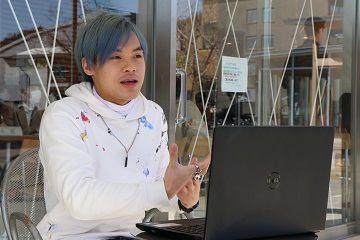
This looks very a complicated problem.
Yeah. We cannot just suppress them. Actually, one of my Japanese friends said that they built a school for these victims who do not want to go to regular schools. It’s something like a bullying-free school. I mean no offense, but I don’t agree. We cannot save these children forever. One day, they need to be in the society which can be more dangerous with more mean people. So we need to help them ‘coexist’ with others, try to find ways to stop this, not separate them. ‘Coexist’ in this context does not mean just living together. It’s more like understanding, being compassionate to each other, regardless of differences.
Thank you for the detailed explanation. By the way, how do you spend your free time?
In my free time, I go to the gym on campus. And since I am a marathon runner, I run around the campus almost every day. And apart from that, I also enjoy playing guitar. It’s a classical guitar, not the one that you need to connect to the amplifier and makes a very loud noise.
Oh, you love classical music?
Yeah, it looks contrast with my look, right? (laughter) And I also love reading. My favorite genre is crime thriller like Stephen King. I also enjoy reading books regarding what I’m studying on, international relations and peace building, operations, things like that.
Do you have any advice for Thai students who are thinking of studying abroad?
I think the most important thing is to know what you want to study. I know many people who wanted to study abroad just because they want to live abroad. And I see many of them fail because they don’t have enough passion to continue their academic paths. So first, think carefully. It’s not something easy, because the graduate level is very much more difficult than the undergraduate level. You need to produce something academic to be a scholar. Next is the destination. For me, it has to be Japan. The destination is important, because you need to spend 2, 3 years living in a different culture, different weather and people. You must be prepared for it. After you have decided all that, have fun and enjoy! It is very short, so enjoy every moment.
I heard that some Japanese students are reluctant to study abroad just because they are not confident in English proficiency. What do you think?
I understand why they feel reluctant, because it’s very common and usual that non-native speakers go overseas and have this concern. But for example, my Japanese was almost zero, but I am here, and I try to develop little by little. Currently I am far from perfect, but I’m quite happy and proud of what I have developed so far, even within one year.
By going abroad, you get a chance to know many people, different cultures and you can acquire all of them. So, if I have a chance to talk to Japanese children who have dreams, I would like to say ‘Don’t be shy, and go for it!’.
Last question. Tell us your dreams.
As I mentioned previously, I would like to work in the U.N. organizations that are related specifically to migration issues. I know that in many corners of the world, many people suffer from the displacement, or some are even killed because of wars. So I want to contribute to these issues. I want all people to be able to be in the place where they want to be without any discrimination. I want for them to be able to get back home without worrying about security.
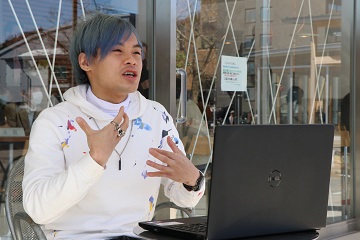
And after studying here for more than a year, I realized that I actually enjoyed studying too. And by doing studies, I can contribute to these issues too, as a researcher. So now I am considering two options; to work at U.N. as a ‘practitioner’, or to investigate the issues to produce something to help people as a ‘researcher’. But at the end of the day, the main goal is the same; to help this world to be more peaceful.
I hope your dreams will come true. Thank you again for joining us today.
‘Otsukaresama deshita’ (Thank you for your hard work).
Photo Gallery
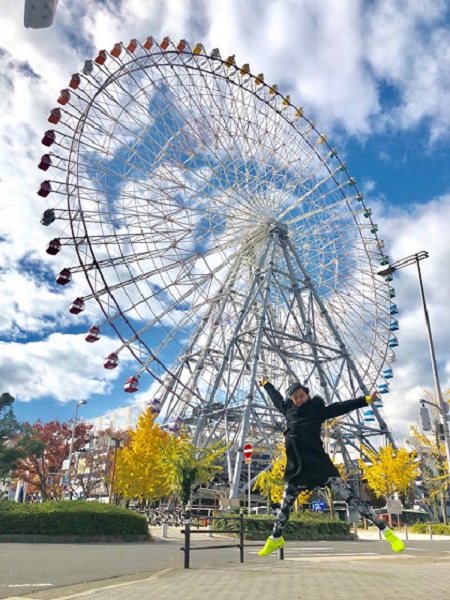
Amazingly beautiful sky and gigantic Tempozan ferris wheel (Osaka)
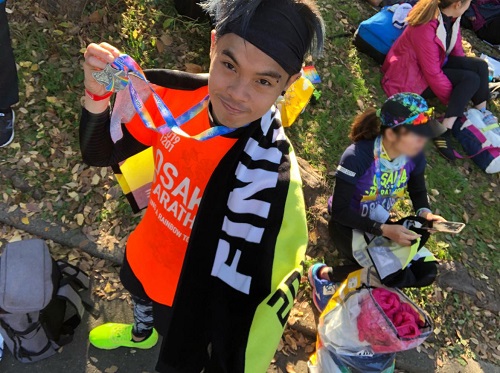
Exhausted, but smiling after 42.195km run in Osaka Marathon 2019
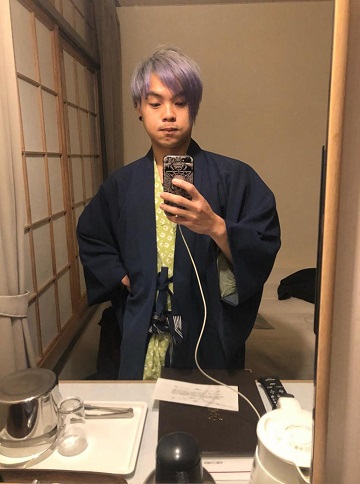
Life is better in Japanese pajamas (Beppu Onsen Resort)

Me, first time snowboarding (Nagano prefecture)
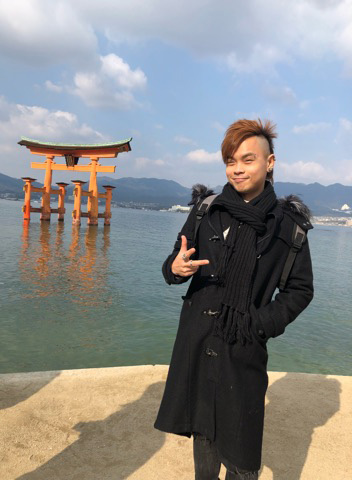
Visiting Miyajima's Itsukushima Shrine, honored as a World Heritage by UNESCO


 Home
Home